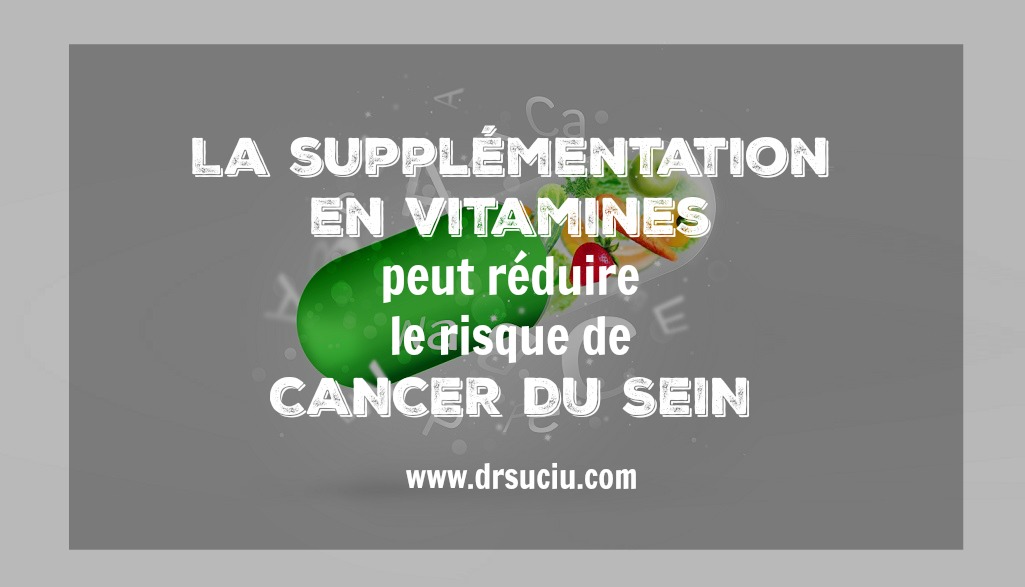|
"Les suppléments de vitamines semblent réduire le risque du cancer du sein d'environ 30%. Les suppléments de calcium ont réduit le risque du cancer du sein de 40%." allègue Jaime Matta, Ph.D., professeur à l'École de médecine Ponce de Puerto Rico. http://www.eurekalert.org/pub_releases/2010-04/aafc-vac041210.php RÉFÉRENCE:
Veuillez lire l'article complet (en anglais seulement) : Abstract CONTEXT: Breast cancer (BC) is the most common cancer in women, with over 1 million new cases diagnosed every year worldwide. Over recent decades, considerable interest has emerged regarding whether vitamins and/or other supplements can lower the risk of BC. However, previous epidemiologic studies that investigated the association between intake of multivitamin and supplements of single vitamins and minerals and BCrisk have reported conflicting results. Whether vitamins can actually reduce BC risk is still controversial. OBJECTIVE:This study examined whether multivitamin and calcium use was associated with BC incidence and DNA repair capacity (DRC). DESIGN:The research team designed an observational, case-control study. SETTING:All work was performed at the Ponce School of Medicine and Health Sciences under the direct supervision of principal investigator Dr Jaime Matta. PARTICIPANTS:Participants were 836 women recruited primarily from the private practices of oncologists, gynecologists, and surgeons in Puerto Rico. INTERVENTIONS:A total of 312 individuals in the breast cancer (BC) group and 524 individuals in the control group were compared for their multivitamin and calcium intake, DRC levels, and other covariates. OUTCOME MEASURES:Odds ratios (OR), adjusted using both crude analysis and multiple logistic regression, were used as measures of association between BC and DRC and other selected variables. RESULTS: The BC group had 30% reduced odds of taking multivitamins and calcium as compared to controls: (1) OR = 0.7 (95% CI, 0.4-1.0; P = .073) for multivitamins and (2) OR = 0.7 (95% CI, 0.4-1.2; P = .167) for calcium. Women with low DRC had 50% lower odds of taking calcium and 30% lower odds of currently taking vitamins OR = 0.5 (95% CI, 0.4-0.7; P = .001) for calcium and (2) OR = 0.7 (95% CI, 0.5-0.9.1; P = .047) for vitamins. CONCLUSIONS: Although this study is a case-control study in which the risk of BC could not be assessed, results suggest that vitamin supplementation could be an independent protective factor for BC. Calcium intake appears to affect DRC in a positive way, because it was associated with a high DRC level, which in turn is associated with low odds for BC. Integr Med (Encinitas). 2013 Jun;12(3):38-46.Breast Cancer and DNA Repair Capacity: Association With Use of Multivitamin and Calcium Supplements. Vergne Y1, Matta J2, Morales L3, Vargas W4, Alvarez-Garriga C5, Bayona M6. Les commentaires sont fermés.
|
AVIS IMPORTANT:
Veuillez prendre connaissance de cet avertissement et rappelez-vous que le site www.drsuciu.com ne saurait remplacer une consultation avec vos professionnels de la santé. L'information fournie sur le site web www.drsuciu.com est d'ordre général. Avant de prendre toute décision de nature médicale ou si vous avez des questions concernant votre état de santé personnel, adressez-vous à un professionnel de la santé qualifiée. D'aucune manière ces points de vue, commentaires et renseignements ne constituent une recommandation de traitement (préventif ou curatif), une ordonnance ou un diagnostic, ni ne doivent être considérés comme tels. Archives
Août 2017
|



 Flux RSS
Flux RSS